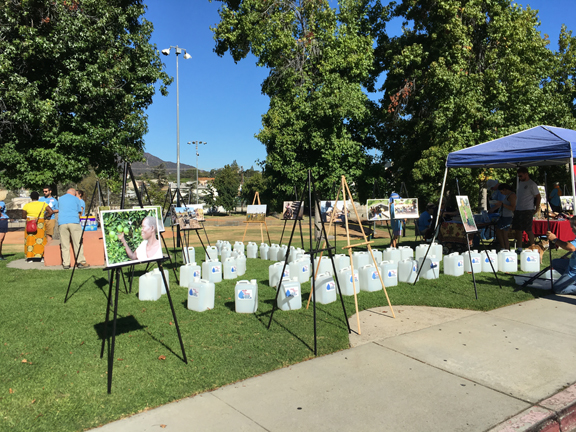
Ugandan emigrant Anne Nyarngi demonstrates how she carried water when living in Africa.
By Julian MITCHELL, intern
“Water is life, but water is also death,” said Peter Keller, head of the Aid Africa organization, speaking on the difficulties and dangers of collecting water in Uganda.
His comment was made in preparation for the annual Walk for Water event held on Saturday in Sparr Heights and Montrose.
While his remark may come as a shock for some, this is the hard truth that many Americans are unaware of. The annual Walk for Water event aims to change that by raising awareness for Americans on the difficulty of carrying water any distance while providing relief for Ugandans in the form of financial support.

On Saturday, participants started walking from Montrose Community Park on Clifton Place in Sparr Heights carrying empty jerry cans. They trekked to the Montrose Fire Station in the 2500 block of Honolulu Avenue where they filled up the cans with water, then headed back to the park. The exercise was to bring to the forefront the difficulty of carrying filled jerry cans, which are heavy when filled, and learning how time-consuming the practice can be.
Aid Africa, which oversaw the event, is a locally based organization. It was able to raise roughly $4,000 from the Walk for Water event that will be dedicated to digging wells in Uganda. The $4,000 included a $1,500 donated from the Glendale Sunrise Rotary Club, which is the cost to install one well.
Before beginning its walk, the group was addressed by Pearls of Africa board member and Ugandan emigrant Anne Nyarngi. Pearls of Africa is a partner organization of Aid Africa that works to help the children of Uganda.
“You’re showing love, which is beautiful,” said Nyarngi as she thanked the crowd who had come to support Aid Africa.

Nyarngi has been in America for over five years, graduated from USC and is now working on furthering her education at Fuller Seminary. She said she began walking to get water when she was only 5 years old, saying she “didn’t know childhood.” She explained that sometimes finding water can be an all day ordeal.
In addition to being time consuming, finding water can be dangerous as well. Mostly women and girls travel in search of water and may have to face horrid circumstances. This includes a number of possible dangers, ranging from attacks from wild animals as well as sexual assault from human predators.
Having a well from which to draw clean water improves the lives for all who can access it, said Nyargni. Being raised to take care of others, Nyarngi stated that she would often deliver water to the elderly who could not go in search of it themselves and risked perishing from a lack of hydration.
“You’re protecting a woman,” said Nyarngi, “but you’re also helping everyone else.”
Children in villages with pumps can spare time to get an education, and do not have to worry about supplying water for their families, in Nyarngi’s case that was 15 people while she was growing up.
“It helps our congregation get a better understanding of the world, and helps to bring us closer together,” said John Pomeroy, a pastor at the First Congregation Church in Pasadena and participant in the Walk for Water event.
The wells Aid Africa help to create also create a source of clean water, reducing the spread of disease among villages.
Aid Africa is also looking to expand its support into South Sudan, which is still facing the harsh consequences of a longtime civil war.
“It’s one thing to have the ability to help, and it is another to strive to help,” said Nyarngi.
Those who wish to help Aid Africa can visit aidafrica.net or by phone at (818)-389-6442.
